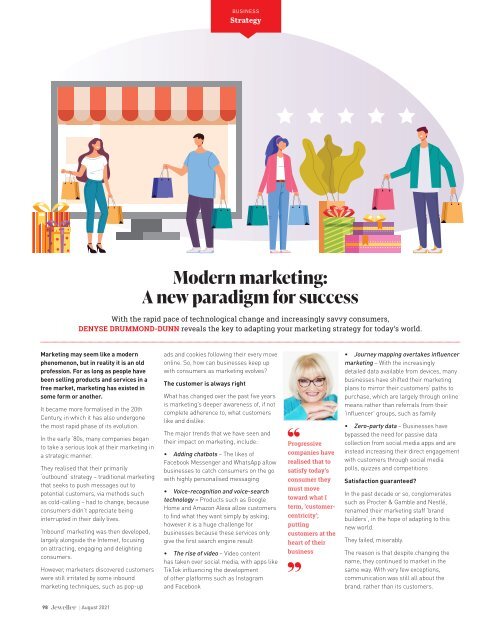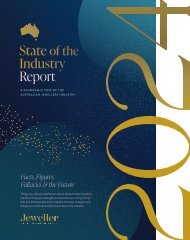Create successful ePaper yourself
Turn your PDF publications into a flip-book with our unique Google optimized e-Paper software.
BUSINESS<br />
Strategy<br />
Modern marketing:<br />
A new paradigm for success<br />
With the rapid pace of technological change and increasingly savvy consumers,<br />
DENYSE DRUMMOND-DUNN reveals the key to adapting your marketing strategy for today’s world.<br />
Marketing may seem like a modern<br />
phenomenon, but in reality it is an old<br />
profession. For as long as people have<br />
been selling products and services in a<br />
free market, marketing has existed in<br />
some form or another.<br />
It became more formalised in the 20th<br />
Century, in which it has also undergone<br />
the most rapid phase of its evolution.<br />
In the early ’80s, many companies began<br />
to take a serious look at their marketing in<br />
a strategic manner.<br />
They realised that their primarily<br />
‘outbound’ strategy – traditional marketing<br />
that seeks to push messages out to<br />
potential customers, via methods such<br />
as cold-calling – had to change, because<br />
consumers didn’t appreciate being<br />
interrupted in their daily lives.<br />
‘Inbound’ marketing was then developed,<br />
largely alongside the Internet, focusing<br />
on attracting, engaging and delighting<br />
consumers.<br />
However, marketers discovered customers<br />
were still irritated by some inbound<br />
marketing techniques, such as pop-up<br />
ads and cookies following their every move<br />
online. So, how can businesses keep up<br />
with consumers as marketing evolves?<br />
The customer is always right<br />
What has changed over the past five years<br />
is marketing’s deeper awareness of, if not<br />
complete adherence to, what customers<br />
like and dislike.<br />
The major trends that we have seen and<br />
their impact on marketing, include:<br />
• Adding chatbots – The likes of<br />
Facebook Messenger and WhatsApp allow<br />
businesses to catch consumers on the go<br />
with highly personalised messaging<br />
• Voice-recognition and voice-search<br />
technology – Products such as Google<br />
Home and Amazon Alexa allow customers<br />
to find what they want simply by asking;<br />
however it is a huge challenge for<br />
businesses because these services only<br />
give the first search engine result<br />
• The rise of video – Video content<br />
has taken over social media, with apps like<br />
TikTok influencing the development<br />
of other platforms such as Instagram<br />
and Facebook<br />
Progressive<br />
companies have<br />
realised that to<br />
satisfy today’s<br />
consumer they<br />
must move<br />
toward what I<br />
term, ‘customercentricity’;<br />
putting<br />
customers at the<br />
heart of their<br />
business<br />
• Journey mapping overtakes influencer<br />
marketing – With the increasingly<br />
detailed data available from devices, many<br />
businesses have shifted their marketing<br />
plans to mirror their customers’ paths to<br />
purchase, which are largely through online<br />
means rather than referrals from their<br />
‘influencer’ groups, such as family<br />
• Zero-party data – Businesses have<br />
bypassed the need for passive data<br />
collection from social media apps and are<br />
instead increasing their direct engagement<br />
with customers through social media<br />
polls, quizzes and competitions<br />
Satisfaction guaranteed?<br />
In the past decade or so, conglomerates<br />
such as Procter & Gamble and Nestlé,<br />
renamed their marketing staff ‘brand<br />
builders’, in the hope of adapting to this<br />
new world.<br />
They failed, miserably.<br />
The reason is that despite changing the<br />
name, they continued to market in the<br />
same way. With very few exceptions,<br />
communication was still all about the<br />
brand, rather than its customers.<br />
98 | <strong>August</strong> <strong>2021</strong>


















